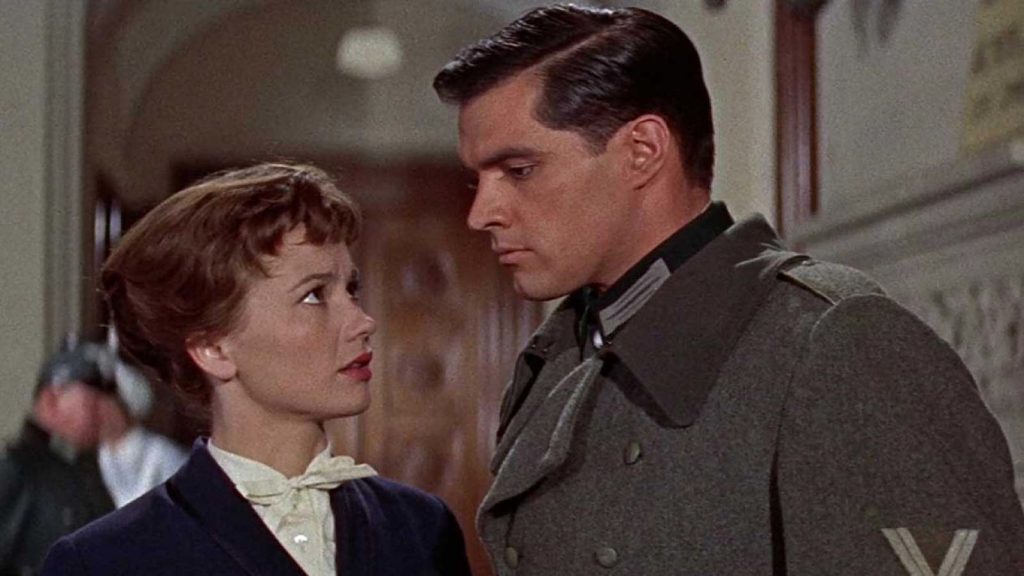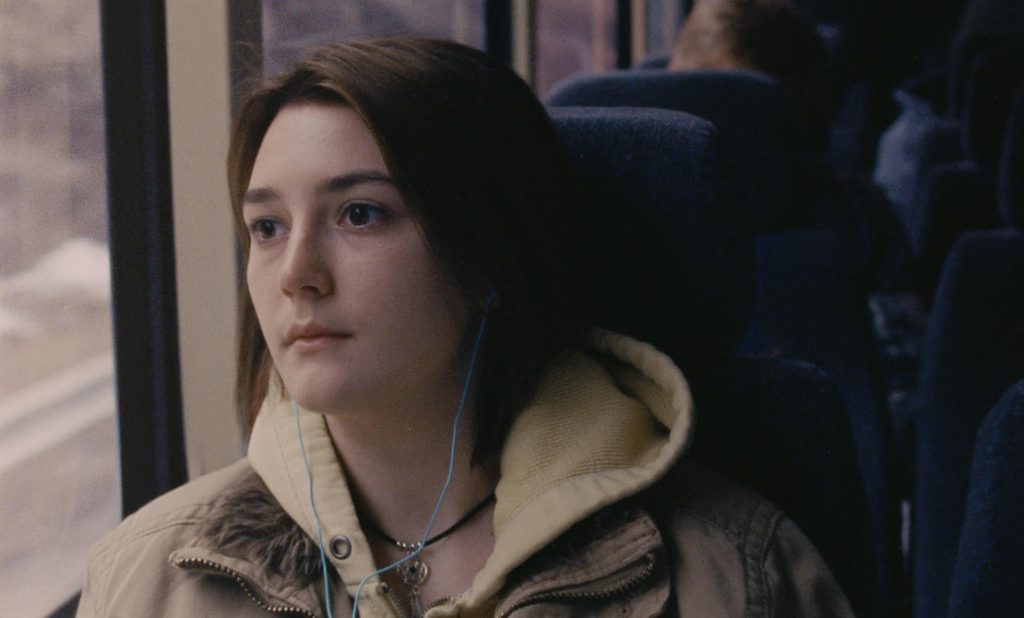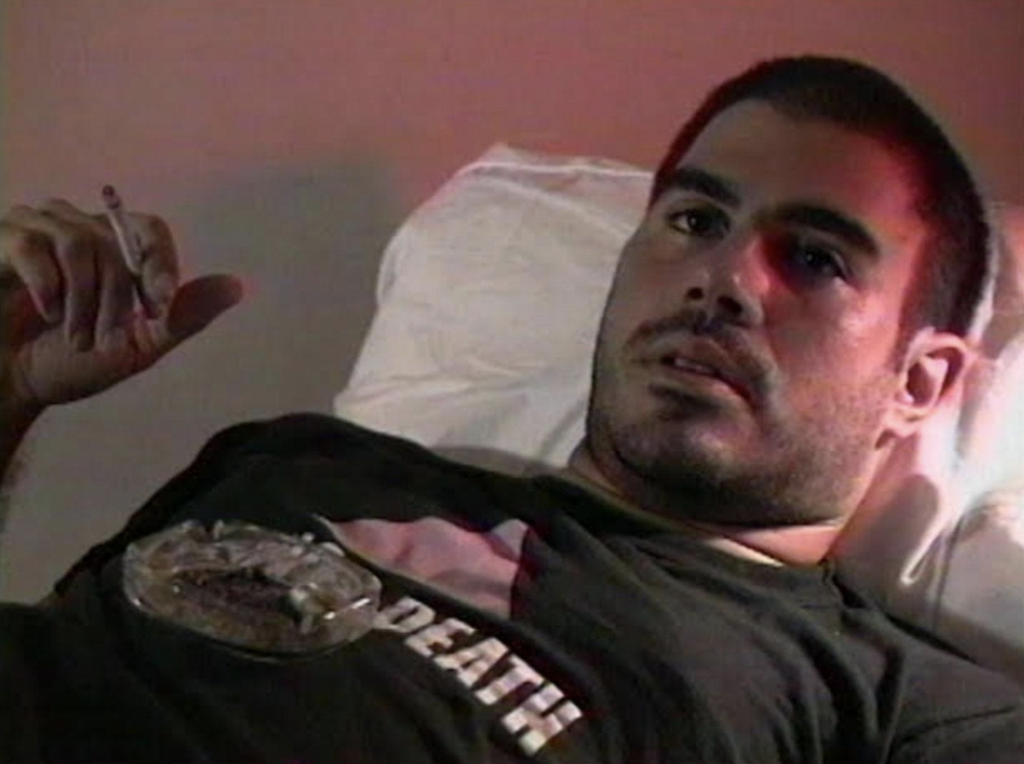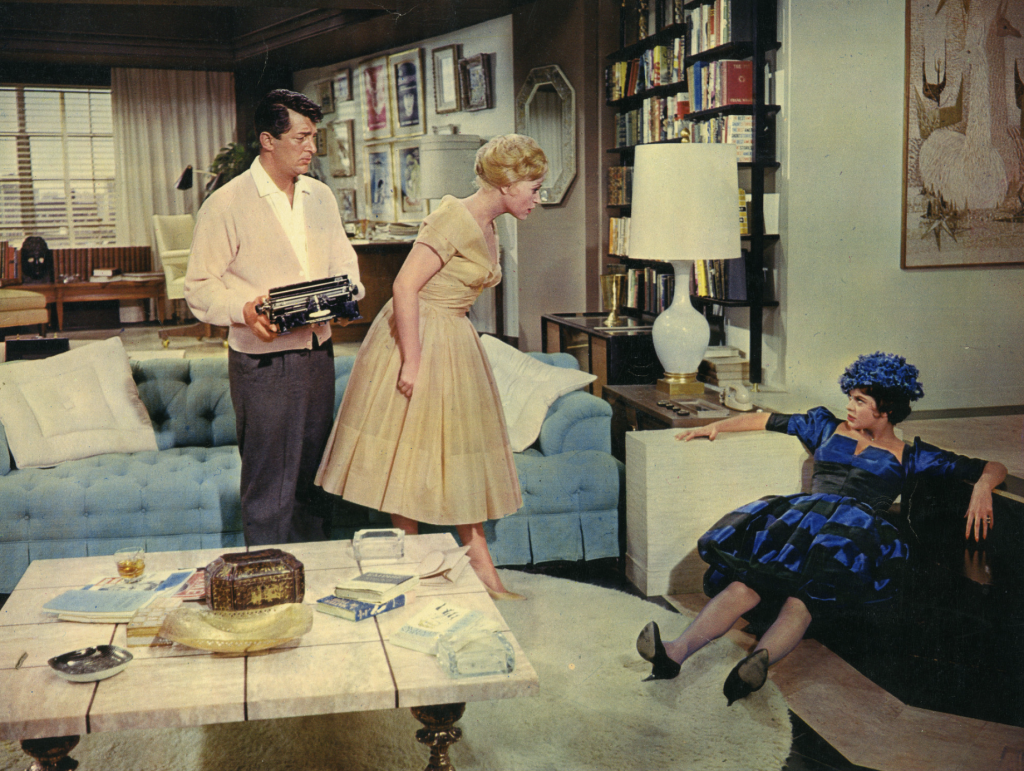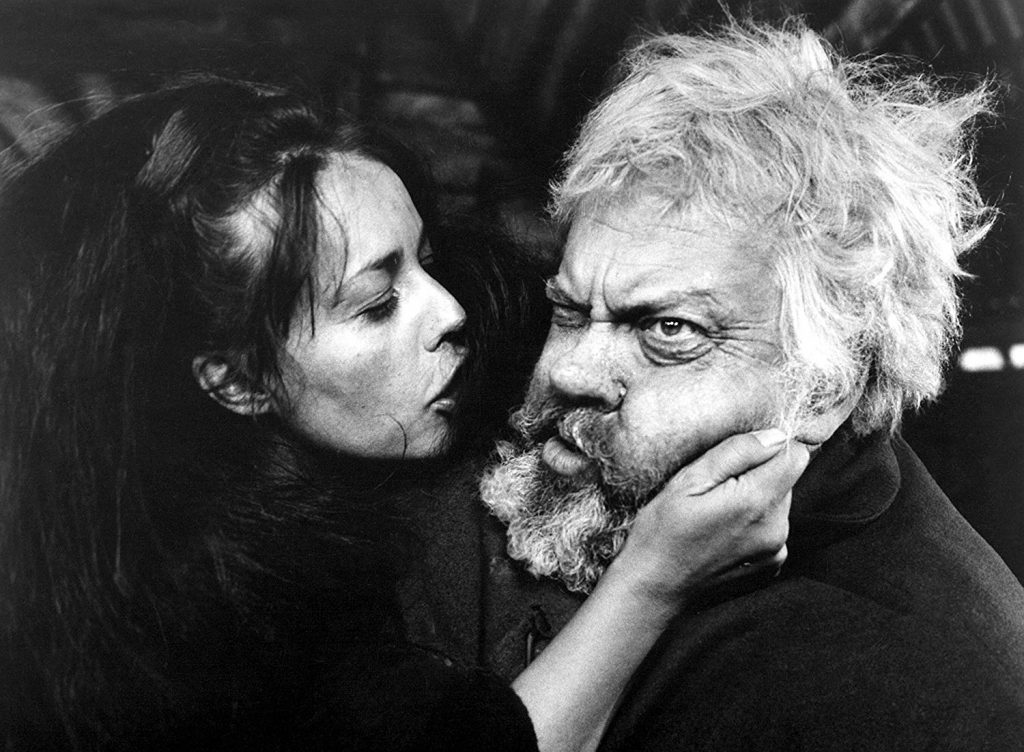Monday, January 23 at 7pm
HEAT
Directed by Michael Mann (U.S. 1995) 170 min. DCP. With Al Pacino, Robert De Niro, Val Kilmer.
Touted as “a master of the modern urban noir” (BAMcinematèk), Michael Mann is also the director regularly chosen to open the Monday night series presented in Professor Ken Eisenstein’s “Introduction to Film Studies” course. In Heat (arguably Mann’s masterpiece), “a tightly wound professional thief (De Niro) and a high-achieving LAPD detective (Pacino) are locked in deadly opposition as they vector towards each other. With his typically powerful choreography of action, sense of epic scope and dazzling use of Los Angeles locales, Mann transforms a gripping heist yarn into a fugue-like existential opera.” (Adapted from BAM notes.)
Monday, January 30 at 7pm
BEYOND A REASONABLE DOUBT
Directed by Fritz Lang (U.S. 1956) 80 min. 35MM. With Dana Andrews, Joan Fontaine, Sidney Blackmer.
Joan Fontaine is the “Lang heroine to end (literally) all Lang heroines” (Dave Kehr), the fiancée of a man who plots his own imprisonment and framing for murder in order to help a newspaper discredit capital punishment. Described by Martin Scorsese as “a savagely stark good- bye to Lang’s adopted country,” Beyond a Reasonable Doubt is an uncompromisingly pessimistic portrait of the modern world. Print Courtesy of the Academy Film Archive.
TOP OF PAGE
Monday, February 6 at 7pm
TEN MINUTES TO LIVE
Oscar Micheaux (U.S. 1932) 58 min. With Lawrence Chenault, A.B. DeComathiere, Laura Bowman.
In his seminal essay “Bad Movies,” J. Hoberman describes legendary director Oscar Micheaux as the “Black Pioneer of American film — not just because he was a black man, or because in his youth he pioneered the West, or because he was the greatest figure in ‘race’ movies and an unjustly ignored force in early American cinema. Micheaux is America’s Black Pioneer in the way that André Breton was Surrealism’s Black Pope. His movies throw our history and movies into an alien and startling disarray.” Ten Minutes to Live’s milieu is a Harlem nightclub, where a movie producer attempts to seduce a singer with the promise of a starring role. Playing with Stan Brakhage’s Burial Path (U.S. 1978, 11 minutes, 16MM). “The film begins with an image of a dead bird. The mind moves to forget, as well as to remember: this film, in the tradition of THOT-FAL’N, graphs the process of forgetfulness against all oddities of the remembered bird-shape. This film might best be seen along with Sirius Remembered and The Dead as the third part of a trilogy.” – S.B.
TOP OF PAGE
Monday, February 13 at 7pm
Ex Libris: The New York Public Library
Directed by Frederick Wiseman (U.S. 2017) 197 min. DCP.
Frederick Wiseman’s film, EX LIBRIS – The New York Public Library, goes behind the scenes of one of the greatest knowledge institutions in the world and reveals it as a place of welcome, cultural exchange and learning. With 92 locations throughout Manhattan, the Bronx and Staten Island, the library is committed to being a resource for all the inhabitants of this multifaceted and cosmopolitan city, and beyond. The New York Public Library exemplifies the deeply rooted American belief in the individual’s right to know and be informed. It is one of the most democratic institutions in America – everyone is welcome. The Library strives to inspire learning, advance knowledge and strengthen communities.
“Critic’s Pick. Magnificent…lays bare this complex, glorious organism that is the democratic ideal incarnate… In EX LIBRIS, democracy is alive and in the hands of a forceful advocate and brilliant filmmaker, which helps make this one of the greatest movies of Mr. Wiseman’s extraordinary career and one of his most thrilling.” – Manohla Dargis, The New York Times
TOP OF PAGE
Monday, February 20 at 7pm
A Time to Love and a Time to Die
Directed by Douglas Sirk (1958 U.S.) 132 min. 35MM. With John Gavin, Liselotte Pulver, Jock Mahoney. In English, German, Russian with English subtitles.
This heartbreaking adaptation of Erich Maria Remarque’s anti-war novel is Sirk’s most personal film. Dedicated to the memory of the son Sirk left in Germany, it traces the life of a young soldier (Gavin) sent to the Russian Front and forced to commit atrocities before meeting a girl while on leave. A sense of encroaching death and ruination grants poignancy to the film’s ill-fated love story and detailed portrait of everyday life in Germany during the war. Beautifully shot in ’scope by key Sirk collaborator Russell Metty, it features Remarque and Klaus Kinski in supporting roles (Melbourne Cinémathèque notes).
TOP OF PAGE
Monday, February 27 at 7pm
Never Rarely Sometimes Always
Directed by Eliza Hittman (2020 U.S.) 101 min. DCP. With Ryan Eggold, Sharon Van Etten, Sidney Flanigan, Talia Ryder, Théodore Pellerin.
Never Rarely Sometimes Always was deservedly awarded a special jury prize at the 2020 Sundance Film Festival for Neorealism, even though no such prize exists. It’s a story ripped directly from the fabric of our times. Newcomer Sidney Flanigan is a revelation as the young teen who travels from her small Pennsylvania town to New York City, where she seeks an abortion amidst a world trying in so many ways not only to deny her but to crush her spirit. Brilliantly shot on location in Super 16mm by Hélène Louvart, the film captures Flanigan braving an inhumane system with a touching mix of tenderness and strength. Real life social worker Kelly Chapman adds another level of realism as a character based on herself (UCLA Hammer Museum).
“A new and radical heroic journey.” – Manohla Dargis, The New York Times
TOP OF PAGE
Monday, March 6 at 7pm
Fast Trip, Long Drop
Directed by Gregg Bordowitz (1993 U.S.) 54 min.
In the spring of 1988, video-maker/activist Gregg Bordowitz tested HIV-antibody positive. He then quit drinking and taking drugs and came out to his parents as a gay man. This imaginative autobiographical documentary began as an inquiry into these events and the cultural climate surrounding them. While writing the film, a close friend was diagnosed with breast cancer and his grandparents were killed in a car accident. The cumulative impact of these events challenged his sense of identity, the way he understood his own diagnosis, and the relationships between Illness and history. Playing with Antigenic Drift (Lewis Klahr, 2007 U.S. 17 min.), whose title is a biological term that refers to the way viruses mutate to stay viable in partially immune populations. This program was curated in connection to the Bucknell Humanities Center’s series Pandemic: Contagion and the Body Politic Series.
TOP OF PAGE
Monday, March 20 at 7pm
L’argent
Directed by Robert Bresson (1983 France) 84 min. 35MM. With Christian Patey, Vincent Risterucci, Caroline Lang, Sylvie Van den Elsen. French with English subtitles.
In his ruthlessly clear-eyed final film, French master Robert Bresson pushed his unique blend of spiritual rumination and formal rigor to a new level of astringency. Transposing a Tolstoy novella to contemporary Paris, L’argent follows a counterfeit bill as it originates as a prop in a schoolboy prank, then circulates like a virus among the corrupt and the virtuous alike before landing with a young truck driver and leading him to incarceration and violence. With brutal economy, Bresson constructs his unforgiving vision of original sin out of starkly perceived details, rooting his characters in a dehumanizing material world that withholds any hope of transcendence.
Monday, March 27 at 7pm
Bells Are Ringing
Directed by Vincente Minnelli (1960 U.S.) 126 min. 35MM. With Judy Holliday, Dean Martin, Jean Stapleton.
Ella, a switchboard operator at the Susananswerphone answering service, habitually gets involved in her client’s personal lives. One client in particular, Jeff, a playboy and writer dealing with writer’s block, has a dreamy voice that makes Ella swoon. Meanwhile Ella’s boss, Sue, is tricked into making Susananswerphone a call center for her bookie boyfriend when she thinks she’s landed a contract with the Titantic Record Company—and it turns out calls for Titanic are coded bets on horse races! Be on the lookout for Frank Gorshin’s spot-on Marlon Brando impersonation. Holliday is reunited with her partners Comden and Green in what would sadly be her last role before her death in 1965 (Museum of Modern Art notes).
TOP OF PAGE
Monday, April 3 at 7pm
Chimes at Midnight
Orson Welles (France/Spain/Switzerland 1966) 113 min. DCP. With Orson Welles, Keith Baxter, John Gielgud, Jeanne Moreau.
Orson Welles’ extraordinary Chimes at Midnight was the culmination of the filmmaker’s lifelong obsession with Shakespeare’s ultimate rapscallion, Sir John Falstaff. Usually a comic supporting figure, Falstaff here becomes the focus: a robustly funny and ultimately tragic screen anti-hero played by Welles with looming, lumbering grace. Integrating elements from both Henry IV plays, as well as Richard II, Henry V and The Merry Wives of Windsor, Welles created a gritty and unorthodox Shakespeare film as a lament, he said, “for the death of Merrie England.” Poetic, philosophical, and visceral—with a kinetic centerpiece battle sequence that rivals anything in the director’s body of work—Chimes at Midnight is as monumental as the figure at its heart.
TOP OF PAGE
Monday, April 10 at 7pm
MIND GAME – Film Club Selection!
Directed by Masaaki Yuasa (Japan 2004) 103 min. DCP.
Buckle in and prepare to surrender yourself to an exhilarating and wildly entertaining ride. Cult classic Mind Game is an explosion of unconstrained expression – gloriously colorful mages ricochet in rapid fire associations, like Masaaki Yuasa’s brain splattered onto the screen in all its goopy glory. Audiences will begin to grasp what they are in for early on as loser Nishi, too wimpy to try to save his childhood sweetheart from gangsters, is shot in the butt by a soccer-playing psychopath, projecting Nishi into the afterlife. In this limbo, God – shown as a series of rapidly changing characters – tells him to walk toward the light. But Nishi runs like hell in the other direction and returns to Earth a changed man, driven to live each moment to the fullest. Introduced by Film Club Vice-President Jamie Granato.
TOP OF PAGE
Monday, April 17 at 7pm
Fear aka La Paura
Directed by Roberto Rossellini (1954 Germay/Italy) 82 min. DCP. With Ingrid Bergman, Mathias Wieman, Kurt Kreuger.
The fifth and final of the Bergman-Rossellini features is in many ways the most painful, set in a territory (Germany) alien to them both, but drawing on personal issues that would soon lead to the end of their relationship. The devoted wife of a prominent scientist, Irene (Bergman) has managed to keep her affair with a handsome younger man a secret from her spouse—until her lover’s jealous ex initiates a blackmail scheme (MOMA program notes). Digital restoration by Fondazione Cineteca di Bologna, Cineteca Nazionale and Istituto Luce Cinecittà as part of the Rossellini Project. Courtesy Janus Films.
Monday, April 24 at 7pm
The Woman on the Beach
Directed by Jena Renoir (1947 U.S.) 71 min. 35MM. With Joan Bennett, Robert Ryan, Charles Bickford, Nan Leslie.
Bennett’s taste in directors was unequalled among Hollywood stars—she worked with everyone from Raoul Walsh to Douglas Sirk—but her most sustained series of major collaborations came in the 1940s, when she worked with Fritz Lang (four films), Max Ophuls (The Reckless Moment), and, on this ambitious, ultimately compromised film, Jean Renoir. A moody, depressive drama about an intersection of lost souls on a metaphorically foggy stretch of Long Island beach, the film was intended by Renoir to be a return to the “poetic realism” that dominated French cinema before the war. But a disastrous preview led to rewrites and reshoots, resulting in a glorious ruin that still contains moments of voluptuous despair and neurotic intensity quite unusual for a Hollywood feature (MOMA program notes).




